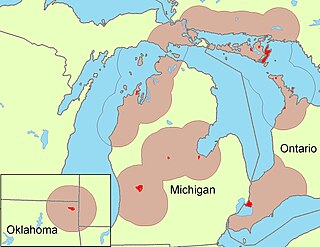
Back Odawaeg Breton Outaouais (langue) French Lenga ottawa PMS Língua ottawa Portuguese Оттава (диалект) Russian
| Ottawa | |
|---|---|
| Nishnaabemwin, Daawaamwin | |
| Native to | Canada, United States |
| Region | Ontario, Michigan, Oklahoma |
| Ethnicity | 60,000 Odawa[1] |
Native speakers | Total: 1,135 US: 965 (2009-2013 language survey)[2] Canada: 220 (2021 census)[3] |
| Language codes | |
| ISO 639-3 | otw |
| Glottolog | otta1242 |
| ELP | Ottawa |
| Linguasphere | 62-ADA-dd (Odawa) |
 Ottawa population areas in Ontario, Michigan and Oklahoma. Reserves/Reservations and communities shown in red. | |
 Ottawa is classified as Severely Endangered by the UNESCO Atlas of the World's Languages in Danger | |
| Person | Odawa |
|---|---|
| Language | Daawaamwin |
Ottawa or Odawa is a dialect of the Ojibwe language spoken by the Odawa people in southern Ontario in Canada, and northern Michigan in the United States. Descendants of migrant Ottawa speakers live in Kansas and Oklahoma. The first recorded meeting of Ottawa speakers and Europeans occurred in 1615 when a party of Ottawas encountered explorer Samuel de Champlain on the north shore of Georgian Bay. Ottawa is written in an alphabetic system using Latin letters, and is known to its speakers as Nishnaabemwin 'speaking the native language' or Daawaamwin 'speaking Ottawa'.
Ottawa is one of the Ojibwe dialects that has undergone the most language change, although it shares many features with other dialects. The most distinctive change is a pervasive pattern of vowel syncope that deletes short vowels in many words, resulting in significant changes in their pronunciation. This and other innovations in pronunciation, in addition to changes in word structure and vocabulary, differentiate Ottawa from other dialects of Ojibwe.
Like other Ojibwe dialects, Ottawa grammar includes animate and inanimate noun gender, subclasses of verbs that are dependent upon gender, combinations of prefixes and suffixes that are connected with particular verb subclasses, and complex patterns of word formation. Ottawa distinguishes two types of third person in sentences: proximate, indicating a noun phrase that is emphasized in the discourse, and obviative, indicating a less prominent noun phrase. Ottawa has a relatively flexible word order compared with languages such as English.
Ottawa speakers are concerned that their language is endangered as the use of English increases and the number of fluent speakers declines. Language revitalization efforts include second language learning in primary and secondary schools.
- ^ Ottawa dialect at Ethnologue (25th ed., 2022)

- ^ "Detailed Languages Spoken at Home and Ability to Speak English". www.census.gov. Retrieved 2017-11-17.
- ^ Government of Canada, Statistics Canada (2022-08-17). "Knowledge of languages by age and gender: Canada, provinces and territories, census divisions and census subdivisions". www150.statcan.gc.ca. Retrieved 2022-12-24.
© MMXXIII Rich X Search. We shall prevail. All rights reserved. Rich X Search